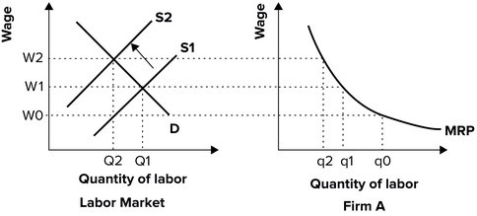Exam 17: Work and the Labor Market
Exam 1: Economics and Economic Reasoning121 Questions
Exam 2: The Production Possibility Model, Trade, and Globalization111 Questions
Exam 3: Economic Institutions144 Questions
Exam 4: Supply and Demand151 Questions
Exam 5: Using Supply and Demand136 Questions
Exam 6: Describing Supply and Demand: Elasticities176 Questions
Exam 7: Taxation and Government Intervention169 Questions
Exam 8: Market Failure Versus Government Failure160 Questions
Exam 9: Comparative Advantage, Exchange Rates, and Globalization107 Questions
Exam 10: International Trade Policy82 Questions
Exam 11: Production and Cost Analysis I160 Questions
Exam 12: Production and Cost Analysis II129 Questions
Exam 13: Perfect Competition137 Questions
Exam 14: Monopoly and Monopolistic Competition231 Questions
Exam 15: Oligopoly and Antitrust Policy111 Questions
Exam 16: Real-World Competition and Technology86 Questions
Exam 17: Work and the Labor Market130 Questions
Exam 18: Who Gets What the Distribution of Income100 Questions
Exam 19: The Logic of Individual Choice: the Foundation of Supply and Demand134 Questions
Exam 20: Game Theory, Strategic Decision Making, and Behavioral Economics76 Questions
Exam 21: Thinking Like a Modern Economist67 Questions
Exam 22: Behavioral Economics and Modern Economic Policy87 Questions
Exam 23: Microeconomic Policy, Economic Reasoning, and Beyond111 Questions
Select questions type
A market in which a single firm hires labor, but workers compete against one another for jobs, is a bilateral monopoly.
(True/False)
4.8/5  (39)
(39)
Two members of the Kenyan parliament from coffee-growing areas said that no firm should have a monopoly to market Kenyan coffee. The retail coffee company Tetu Coffee has sparked a storm in the industry by promising to earn the country Sh400 (Kenyan Shilling) billion annually if given exclusive licenses to market Kenyan coffee. The members of parliament said the coffee bean farmers should be free to sell their beans to the highest bidder. If all coffee growers had to sell their produce to Tetu Coffee, this would be a(n):
(Multiple Choice)
4.7/5  (39)
(39)
Refer to the graphs shown.  If labor supply shifts from S1 to S2, the market wage rate will:
If labor supply shifts from S1 to S2, the market wage rate will:
(Multiple Choice)
4.8/5  (41)
(41)
If the productivity of labor diminishes only slowly as output increases, labor:
(Multiple Choice)
4.8/5  (42)
(42)
The development of complex algorithms that perform "brain work" in the future is likely to:
(Multiple Choice)
4.9/5  (39)
(39)
If the quantity of labor supplied increases by 5 percent when the wage increases by 10 percent, the elasticity of labor supply is:
(Multiple Choice)
5.0/5  (39)
(39)
The same year that Derek Jeter, one-time shortstop for the New York Yankees, received an annual salary of $23.2 million, the president of the United States received an annual salary of $400,000. Based on marginal productivity theory and assuming these markets are competitive, this salary differential indicates that:
(Multiple Choice)
4.9/5  (38)
(38)
If the demand for legal services decreases, the demand for legal assistants probably will:
(Multiple Choice)
4.9/5  (37)
(37)
Showing 121 - 130 of 130
Filters
- Essay(0)
- Multiple Choice(0)
- Short Answer(0)
- True False(0)
- Matching(0)